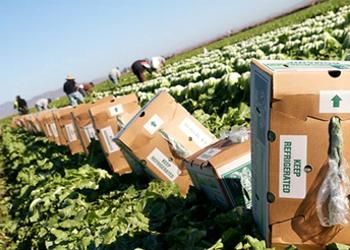
ATLANTA, Georgia, April 21, 2018 (ENS) – The U.S. Food and Drug Administration, along with the Centers for Disease Control and Prevention and state and local partners, are investigating a multistate outbreak of E. coli O157:H7 illness linked to romaine lettuce grown in Yuma, Arizona.
The first reports of illness in March were linked only to chopped romaine lettuce. But on April 19, Alaska health officials announced that several people in a correctional facility were infected with the outbreak strain of E. coli O157:H7 after eating whole-head romaine lettuce from Yuma.

Based on this new information, the FDA is advising that consumers avoid all romaine lettuce from Yuma. “If you cannot determine the source of your romaine lettuce, throw it away and don’t eat it,” the FDA warns.
The CDC reports that 53 people in 16 states have become ill. These people reported becoming ill in the time period of March 13 to April 6, 2018.
Forty-one (95%) of 43 people interviewed reported eating romaine lettuce in the week before their illness started.
Most people reported eating a salad at a restaurant, and romaine lettuce was the only common ingredient identified among the salads eaten. The restaurants reported using bagged, chopped romaine lettuce to make salads.
At that time, ill people were not reporting whole heads or hearts of romaine.
But on April 19, 2018, Alaska health officials announced that several people in the correctional facility who got sick with the outbreak strain of E. coli O157:H7 ate whole-head romaine lettuce from Yuma.
No specific grower, supplier, distributor, or brand has been identified at this time.
The FDA recommends that consumers ask grocers, restaurants, and other food service establishments where their romaine lettuce originated, and avoid any romaine lettuce, whether chopped, whole head or hearts, that originated from Yuma.

The FDA is continuing to investigate this outbreak and will share more information as it becomes available.
Some kinds of E. coli cause disease by making a toxin called Shiga toxin. The bacteria that make these toxins are called Shiga toxin-producing E. coli, or STEC for short.
The CDC advises that consumers who have symptoms of STEC infection should contact their health care provider to report their symptoms and receive care. Although many infections resolve in five to seven days, they can result in serious illness, including a potentially serious condition called hemolytic uremic syndrome.
The current outbreak is not related to a recent multistate outbreak of E. coli O157:H7 infections from November to December 2017 linked to consumption of leafy greens. The CDC says people in the previous outbreak were infected with a different DNA fingerprint of E. coli O157:H7 bacteria.
Copyright Environment News Service (ENS) 2018. All rights reserved.
© 2018, Environment News Service. All rights reserved. Content may be quoted only with proper attribution and a direct link to the original article. Full reproduction is prohibited.
